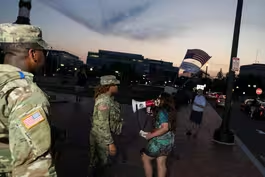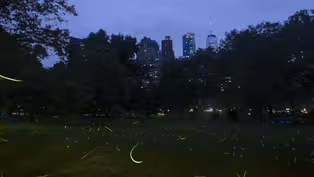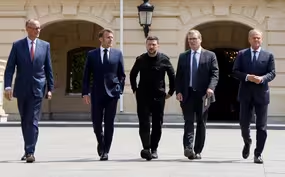
August 17, 2025 - PBS News Weekend full episode
8/17/2025 | 24m 9sVideo has Closed Captions
August 17, 2025 - PBS News Weekend full episode
August 17, 2025 - PBS News Weekend full episode
Problems playing video? | Closed Captioning Feedback
Problems playing video? | Closed Captioning Feedback
Major corporate funding for the PBS News Hour is provided by BDO, BNSF, Consumer Cellular, American Cruise Lines, and Raymond James. Funding for the PBS NewsHour Weekend is provided by...

August 17, 2025 - PBS News Weekend full episode
8/17/2025 | 24m 9sVideo has Closed Captions
August 17, 2025 - PBS News Weekend full episode
Problems playing video? | Closed Captioning Feedback
How to Watch PBS News Hour
PBS News Hour is available to stream on pbs.org and the free PBS App, available on iPhone, Apple TV, Android TV, Android smartphones, Amazon Fire TV, Amazon Fire Tablet, Roku, Samsung Smart TV, and Vizio.
Providing Support for PBS.org
Learn Moreabout PBS online sponsorshipJOHN YANG: Tonight on PBS News Weekend, European leaders will join Volodymyr Zelenskyy for tomorrow's high stakes Oval Office meeting to present a united front.
Then, how trouble getting a good night's sleep has become a public health emergency.
And one man's quest to capture dazzling images of fireflies and raise awareness about the threats facing these glowing symbols of summer.
MAN: I stumbled upon a forest with millions and millions of fireflies synchronizing their flashes across vast expanses of the forest.
And there's been no looking back.
(BREAK) JOHN YANG: Good evening.
I'm John Yang.
The last time Ukrainian President Volodymyr Zelenskyy was in the Oval Office, things got heated as President Trump loudly berated him.
But when he returns tomorrow, he'll have reinforcements.
At least a half dozen European leaders will join him in a high profile display of unity.
After meeting with Russian President Vladimir Putin last week, Mr. Trump aligned himself with Russian positions that triggered European fears that Ukraine could be pressured into accepting a deal on Moscow's terms.
Today, Zelenskyy was in Brussels meeting with European Commission President Ursula von der Leyen.
URSULA VON DER LEYEN, President, European Commission: Since the beginning of Russia's brutal invasion, Europe has been at Ukraine's side united.
And we will support you for as long as it takes for just and lasting peace.
VOLODYMYR ZELENSKYY, Ukrainian President: It's very important that you are with us and that we speak to America.
And we speak together.
JOHN YANG: To look ahead tomorrow's meeting, William Taylor, he's a distinguished fellow at the Atlantic Council's Eurasia Center.
He's a former U.S. ambassador to Ukraine and was temporary head of mission there the first Trump term, later testifying in Mr. Trump's impeachment.
Mr.
Ambassador, this is going to be a remarkable scene in the Oval Office tomorrow.
You've got heads of state flying to Washington on a moment's notice to support Zelenskyy.
How unusual is this?
WILLIAM TAYLOR, Former U.S. Ambassasdor to Ukraine: It's very unusual, John.
You're exactly right.
This is a measure.
This is a demonstration of how strongly the Europeans feel about Ukraine.
And how about supporting Zelenskyy.
They got together.
We remember last Wednesday on a telephone, on a Zoom call, the same group with Zelenskyy and Trump and that group, a group of European leaders, and they all agreed on what the approach would be in Anchorage.
They agreed to focus on a cease fire that seemed to have come apart in Anchorage.
JOHN YANG: Do you think this meeting could put it back together?
Can, can Trump be persuaded?
WILLIAM TAYLOR: Surely.
Surely he can.
It is possible that he can.
And the Europeans, among the Europeans are some Europeans who understand and work closely and are well trusted by President Trump.
So the answer, I think is yes.
JOHN YANG: And is there a danger that the president could feel ganged up on, that this could backfire?
WILLIAM TAYLOR: I understand actually, that the first part of the meeting will be President Trump and President Zelenskyy, and then they'll go into a broader meeting, maybe a lunch with all the rest of those, those Europeans, other Europeans, because Zelenskyy is one as well.
But so he'll have a one on one, Trump and Zelenskyy and then a broader discussion.
JOHN YANG: Administration officials are saying today that in Alaska, Putin agreed to the United States and Europe providing security for Ukraine, sort of a mini NATO.
How significant is that?
WILLIAM TAYLOR: Huge.
This is huge.
This is not something we've heard from the President Trump or from the administrative - - U.S. administration.
And it's so welcome, so necessary.
If there's to be a ceasefire, there needs to be some security guarantee for the Ukrainians so that they can be confident that if they do lay down their arms or stop firing, that the Russians won't invade again.
And that's what this force would do.
JOHN YANG: At the same time, Mr. Trump told European leaders that Putin does want territory in exchange for this.
What, what, how likely is that to happen?
WILLIAM TAYLOR: This can be -- this could be done if the Europeans and the Ukrainians will say, look, we acknowledge, we recognize that you Russians are in 19 percent of Ukraine.
We don't like it.
We'll never recognize your legal claim to that 19 percent, but we recognize you're there.
So in that regard, Putin will be able to stay in that 19 percent, at least temporarily.
The Ukrainians will never agree to a long term, a permanent loss of that territory.
They won't and they can't.
But they could acknowledge that the de facto, the Russians are there.
That might be enough to get a ceasefire.
JOHN YANG: What do you think is going to come out of tomorrow?
WILLIAM TAYLOR: Demonstration of unity.
I think it's very clear that the Europeans, including Zelenskyy, will be very together and they'll be focused on a cease fire and they'll be focused on that security guarantee that you raised.
They may also talk about, I hope they talk about this $300 billion of Russian money that's in European and American banks to be used to buy weapons from the United States firms, defense firms, for Ukraine to use and to reconstruct Ukraine once the cease fire goes into effect.
So there's a lot on the table, but the importance is they're unified and they can make the strong case to President Trump.
JOHN YANG: Do you think it creates a path to a deal?
WILLIAM TAYLOR: It could, it could.
There is a deal there.
There's a deal there.
Again, the Ukrainians never will give up legal claim to that territory, but they'll grudgingly accept that the Russians are there and they'll probably say they won't try to take back that 90 percent by force.
That could lead to - - that could lead to a ceasefire in place.
JOHN YANG: So it's sort of language, how you describe the Russian presence.
WILLIAM TAYLOR: It's how you describe the Russian presence.
But that makes a big difference.
That makes a, you know, the West Germans never gave up hope, claimed that East Germany would come back sometime, but they promised in order to get into NATO, they promised not to try to take East Germany back by force, by military force and they got into NATO and they finally got East Germany back.
JOHN YANG: Former Ambassador William Taylor, thank you very much.
WILLIAM TAYLOR: Thank you, John.
JOHN YANG: In the day's other headlines, more than 700 additional members of the National Guard are to be deployed to Washington, D.C. in the coming days.
The governors of West Virginia, South Carolina and Ohio, all Republicans, say they're acting to aid the Trump administration's efforts to take over law enforcement in Washington in the name of cracking down on crime and homelessness.
Over the weekend, critics took to the streets to express their anger over what the administration is doing.
According to the latest justice department figures, in 2024, violent crime in the city hit a 30-year low.
Thousands of Israelis joined a nationwide strike today to demand the end of the war in Gaza and the return of the hostages.
Demonstrators block the major highway between Tel Aviv and Jerusalem while carrying photos of some of the 50 hostages Israel says are still being held by Hamas.
Only 20 are believed to be still alive.
They criticized the government's decision to escalate military operations and called on officials to negotiate a ceasefire.
In Gaza City, Palestinians tried to figure out where to go as the IDF prepares to take control of the city.
The Israeli military says it will provide tents for those who leave, but Hamas said the plan will only lead to genocide and displacement.
Striking Air Canada flight attendants are defying a government back to work order keeping the airline grounded for at least one more day.
The union representing 10,000 flight attendants said the order was unconstitutional and that its members won't go back to work because the airline has refused to negotiate.
On Saturday, Canada's jobs minister ordered the attendance to resume working and sent their contract dispute with the airline to binding arbitration.
Air Canada said it now expects to resume flights Monday evening.
Still to come on PBS News Weekend, why can't Americans sleep?
We look at how insomnia has become a public health emergency and the environmental consequences of Big Tech's push to ease regulations on AI.
(BREAK) JOHN YANG: The American Academy of Sleep Medicine says that about 12 percent of Americans suffer from chronic insomnia, the difficulty falling asleep or staying asleep.
It's more than just annoyance.
The resulting daytime fatigue, depression and low motivation can lead to accidents, lost productivity and other consequences.
The August edition of The Atlantic has a writer's personal account of her struggle with insomnia and her search for a remedy.
The article is by Atlantic staff writer Jennifer Senior.
Jennifer, help us understand what someone goes through with insomnia.
What is it like to not be able to fall asleep?
And then the next day, how do you feel?
JENNIFER SENIOR, Staff Writer, The Atlantic: It's lonely, actually, not being able to fall asleep.
And first it's perplexing and then it's anxious making, and then it's just, it makes you really worn out and depressed the next day and, you know, dysregulated and irritable.
And over time, of course, the accumulated fatigue just runs you down and makes you vulnerable to being sick and, you know, all sorts of things.
JOHN YANG: You say it makes you depressed.
For a long time, people thought that depression led to insomnia, but that's not the case, is it?
JENNIFER SENIOR: Insomnia can certainly be one of the manifestations of depression.
Right.
But I think what's interesting, what increasingly people are recognizing, is that in some ways insomnia is a better predictor of depression than the other way around.
And also that depression follows insomnia more than the other way around.
It's bidirectional, as health professionals like to say.
But insomnia can make you depressed for sure.
JOHN YANG: You also write that a lot of the experts you talked to said a lot of the sleep dogma we're told needs to be challenged.
What are some of the big items there?
JENNIFER SENIOR: There's a sizable body of evidence saying that eight hours of sleep is not necessarily the magic number.
There have been many analyses duplicated over and over again that say that actually seven is the magic number.
Somewhere between 6.5 hours of sleep and 7.4 hours.
There are problems with all these kinds of analyses.
So, I don't want to say that eight hours is wrong.
But also we vary from individual to individual may vary over the course of a lifetime.
So that's the biggest thing, and I can give you others, but that's the one that really looms into view.
JOHN YANG: You write that sleep deprivation, not just insomnia, is essentially a national health emergency that's not being addressed.
Talk about that.
JENNIFER SENIOR: Well, yeah, 16.4 percent of Americans work nonstandard hours, which is to say generally graveyard shifts.
There is a substantial portion of Americans who also work second jobs.
There are single mothers, there are single fathers.
If you're a white collar professional, there is boundary between home and office has virtually dissolved.
And by the way, widespread electrification laid waste to our circadian rhythms over a hundred years ago.
So there's just a million things that conspire now against a proper night's rest.
JOHN YANG: And tell us about therapies and remedies you've tried.
JENNIFER SENIOR: I mean, in the beginning when this happened, I tried acupuncture, acupressure, listening to all kinds of meditation tapes.
There were tapes in those days, I'm sad to say.
I would exercise like a demon.
I would do deep breathing exercises.
I did neurofeedback and biofeedback and all the things.
I eventually tried chronic behavioral therapy for insomnia.
And eventually I started using medication.
But that was further down the road and its own kind of independent adventure.
JOHN YANG: Some of the practitioners you talked to said that some of their patients wait 10 years before seeking help.
What is your advice to someone who may be going through this?
JENNIFER SENIOR: Don't wait 10 years.
Cognitive behavioral therapy for insomnia is the gold standard.
It involves sleep compression therapy, which is very, very hard to do, but builds up a lot of sleep pressure in a person.
It involves curtailing your sleep at first.
Why people wait is sometimes because they don't know cognitive behavioral therapy exists.
And there are waiting lists for the practitioners.
There are too few practitioners who do it.
But there are very good online and also apps that do it two developed by the military and the VA. And you can look to see which one has sleep restriction therapy in it, because that's the good one.
I would also say don't be afraid of medication early under a doctor's supervision.
Taking medication can help plop your body back on a rail.
But I think CBTI chronic behavioral therapy for insomnia is really something that one ought to explore online and hopefully with a practitioner near you.
JOHN YANG: Jennifer Senior of The Atlantic, thank you very much.
JENNIFER SENIOR: Thank you for having me here.
JOHN YANG: The rapid growth of AI is creating a data center boom.
Across the country big tech is building massive facilities for their cutting edge AI infrastructure.
But half century old environmental protections are slowing that.
WIRED magazine has found that big tech companies are asking the White House to ease those protections and that the Trump administration appears to be all in.
Ali Rogin spoke with Molly Taft, a senior reporter at Wired.
ALI ROGIN: Thank you so much for joining us.
So what regulatory protections are these AI companies seeking to roll back?
MOLLY TAFT, Senior Reporter, WIRED: There's a lot of environmental asks, but one specific protection that caught my eye was a very specific ask around a section of the Clean Water Act, which is known as a 404 permit, which is named after the section of the Clean Water act it refers to.
So, if you're building anything that will impact a federally protected waterway, if you're building a road across a wetland, if you're building a building that nudges up into a protected stream, if you're altering the course of a river, you're going to need a permit.
It can be a pretty cumbersome process, can be expensive and add a couple years onto a project.
What the federal government has done is said there's a set of activities that we will just say, okay, you don't need to go through this cumbersome permitting process.
You can just get a blanket permit.
And what the tech industry is asking for is for data centers to be included in this list.
This was a specific ask from Meta and the Data Center Coalition, which is the industry's largest lobbying arm, includes members like Amazon, Google, Meta as well.
And so these are the companies that are asking for this very specific permission under the Clean Water Act.
ALI ROGIN: And what would this permission get them?
MOLLY TAFT: It would basically just enable them to speed up construction of data centers.
That's been kind of their ask, you know, we're in sort of an interesting political moment right now where across the aisle there's this sense that, you know, one of the reasons we haven't been able to build so much is because we have a lot of environmental regulations that hold up projects that, you know, don't speed them forward.
And so this section of the Clean Water Act has kind of long been a complaint from, you know, the construction industry, from the oil and gas industry.
This is kind of one of those regulations that industries sort of see as, you know, a hindrance to their project.
So basically, if a nationwide permit for data centers is theoretically granted, they could move forward with a couple of years, shaved off the final project and they also might have to have less public notice of what they're planning to do, which is another ask that was in some of these documents.
ALI ROGIN: This isn't the first time that industries have requested these permits.
But what seems to be unique about this moment is the alignment between industry and the amenability of this administration.
Is that something that you are watching closely in terms of how this all plays out?
MOLLY TAFT: Yeah, I think that's an important point to make.
On the one hand, there are data centers that have the environmental footprint of like a Walmart.
It probably isn't that big of a deal.
But on the other hand, there are tech giants building massive data centers that could really impact the local waterways.
Amazon, for instance, is building a data center Indiana.
They would fill in almost 10 acres of wetland and impact thousands of streams in the region.
And so what we're tracking is, you know, less what might happen with specific projects, but more about how the Trump administration is using AI and using the build out of data centers in its larger deregulatory agenda.
This is checking off kind of wish list items from multiple industries to get some of these regulations out of the way.
ALI ROGIN: And what are the industry saying about why they need this permit?
What argument are they making that the benefits here outweigh the potential environmental risks?
Are they making that argument?
MOLLY TAFT: I think the industries are saying that, you know, in order for the U.S. to compete with China, we need to be building more data centers.
Tomorrow we're going to have this huge need for these projects.
Anywhere and everywhere there is availability and they need to go up as soon as possible for us to win the AI arms race.
And I think they'd also say that, you know, many of these buildings have less of an environmental footprint from their actual physical structures than some other things that might require, you know, a more thorough Clean Water act permit process.
But, you know, experts I spoke to were, did say, look, on the one hand it is true that some of these projects may not have as big of an environmental footprint, but on the other, especially when we're talking about data center and water use, this is such a complex topic and we're really seeing this industry kind of being let off the leash a little bit and kind of charging forward and building out structures across the country.
ALI ROGIN: Molly Taft with Wired.
Thank you so much.
MOLLY TAFT: Thank you so much for having me.
JOHN YANG: Finally tonight, for many, fireflies are part of the story of summer, evoking memories of lazy, hot evenings spent trying to catch them in glass jars.
Now we meet a man who's still trying to catch them, not with a jar, but with a camera.
JOHN YANG (voice-over): In Amazonian folklore, the light of fireflies is a beacon of hope and guidance from the gods.
Japanese legend has it that they're symbols of love, war, and departed souls.
And for National Geographic explorer and firefly specialist Sriram Murali -- SRIRAM MURALI, National Geographic Explorer: Coming from India, fireflies are symbolic of the night and the jungles.
JOHN YANG (voice-over): Murali has been fascinated by fireflies since the night.
Years ago, he was searching for stars near his hometown in southern India.
SRIRAM MURALI: I stumbled upon a forest with millions and millions of fireflies synchronizing their flashes across vast expanses of the forest.
And there's been no looking back.
The first time I saw it, I almost felt like I was transported to another planet.
JOHN YANG (voice-over): Fireflies once shared earth with dinosaurs, but now their numbers are declining.
This summer, Murali came to the United States to document how fireflies are coping in big cities.
SRIRAM MURALI: The fireflies in D.C. and New York are found in some of the most urban conditions, like in Battery Park in New York, which is just a couple of blocks from Wall Street, and in the National Mall in D.C. right in front of Lincoln Memorial.
To me, how these fireflies have adapted to live in such bright, harsh conditions really amazes me.
And I wanted to tell a story about these fireflies, about how resilient they are.
JOHN YANG (voice-over): There are more than 2,000 species.
Eastern fireflies have proven to be adaptable to urban environments, but many other species haven't fared as well.
Their enemies include climate change, pesticides, habitat loss, and light pollution.
SRIRAM MURALI: Fireflies flash to communicate, especially to find a mate.
And in lit areas, artificial lighting drowns their flashes, so the males and females are not able to see each other.
They don't reproduce and there are no offsprings.
And in a couple of seasons, the population vanishes.
JOHN YANG (voice-over): Murali has some suggestions to prevent that.
SRIRAM MURALI: Support native vegetation and do not use pesticides.
And keep your outdoor lighting to a minimum.
Use a motion sensor if possible.
It helps the migrating birds as well.
JOHN YANG (voice-over): A little less light could provide a healthier ecosystem so that fireflies will be able to continue to shine for generations to come.
JOHN YANG: And that is PBS News Weekend for this Sunday.
I'm John Yang.
For all of my colleagues, thanks for joining us.
Have a good week.
The environmental consequences of looser regulations for AI
Video has Closed Captions
Clip: 8/17/2025 | 5m 3s | The environmental consequences of big tech’s push to ease regulations for AI development (5m 3s)
News Wrap: Three states deploy National Guard troops to DC
Video has Closed Captions
Clip: 8/17/2025 | 2m 14s | News Wrap: West Virginia, South Carolina, Ohio deploying National Guard troops to DC (2m 14s)
Photographer raises awareness of fireflies under threat
Video has Closed Captions
Clip: 8/17/2025 | 2m 54s | A photographer’s quest to raise awareness of fireflies under threat with dazzling images (2m 54s)
What to expect from Zelenskyy’s next meeting with Trump
Video has Closed Captions
Clip: 8/17/2025 | 5m 43s | What to expect from Zelenskyy’s next meeting with Trump, backed by European leaders (5m 43s)
Why insomnia is becoming a U.S. public health emergency
Video has Closed Captions
Clip: 8/17/2025 | 5m 9s | Why insomnia is becoming seen as a public health emergency in the U.S. (5m 9s)
Providing Support for PBS.org
Learn Moreabout PBS online sponsorshipSupport for PBS provided by:
Major corporate funding for the PBS News Hour is provided by BDO, BNSF, Consumer Cellular, American Cruise Lines, and Raymond James. Funding for the PBS NewsHour Weekend is provided by...
















